Guide to Male Fertility Supplements
“Male fertility supplements” or “sperm health supplements” are vitamins, minerals, and even herbs that support healthy sperm production. We’ve compiled information on the evidence behind each male fertility supplement below and how they each play a role in optimizing male fertility.
Male fertility supplements or male fertility vitamins include but are not limited to: CoQ10, vitamin D, vitamin C, folate, zinc, and more. Our Guide to Male Fertility Supplements will break each one down along with its impact on male fertility.
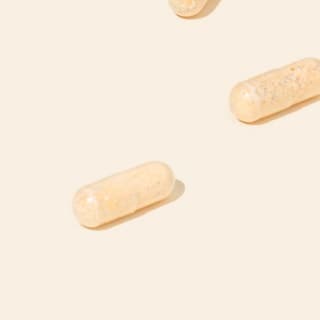
Table of contents:
Recommended male fertility supplements
The following male fertility supplements and male fertility vitamins can play a role in optimizing your fertility, helping increase crucial semen parameters including sperm motility, morphology, sperm count, and sperm concentration. These male fertility supplements have some good scientific evidence to support their use.
CoQ10
Also known as: Coenzyme Q10, ubiquinol, ubiquinone
A critical nutrient in our metabolism, coenzyme Q10 can have additional benefits as a male fertility supplement. Increases in sperm concentration, motility, and morphology, and fertilization rates have all been described after several weeks of supplementation.
CoQ10 plays a key role in the body. It is essential for our metabolism to function, and also acts as a very strong antioxidant. It’s often used to treat cardiac conditions, and has been researched for its effects on cancer, Parkinson’s disease, and migraines, among many others.
Many energy-dependent processes in sperm cells also rely on the availability of CoQ10 as a male fertility supplement. Additionally, sperm are extremely sensitive to the effects of free radicals (harmful byproducts of body metabolism). Anywhere from 30–80% of male-factor infertility cases may be due to oxidative stress. CoQ10, as a potent antioxidant and facilitator for metabolism, is effective for improving sperm parameters.
As early as 1997, researchers tested the effects of CoQ10 on infertile men and found a significant increase in motility and fertilization rates. A more recent review examined three different studies and found that sperm concentration and motility were significantly increased after several weeks of CoQ10 being used as a male fertility supplement.
Another review, published in 2020, undertook a meta-analysis of three CoQ10 clinical trials, concluding that “CoQ10 has a profound effect on sperm motility.” A typical daily dose of CoQ10 as a male fertility supplement is between 200 and 300mg.
L-carnitine
L-carnitine is derived from an amino acid, the building blocks of proteins. It’s involved in the production of energy in the body, where it helps transport fatty acids into your cells’ mitochondria. L-carnitine is produced naturally in the body and is normally concentrated in the testis and epididymis (the structure in the testicles where sperm is stored).
Supplementation has been shown to improve sperm motility, possibly by supporting mitochondrial function. Several small studies (1, 2, 3) examining the use of L-carnitine as a male fertility supplement, researchers found that administration of L-carnitine was associated with an increase in sperm motility for men dealing with asthenozoospermia (poor sperm motility), over 3–6 months.
In one trial, researchers found that L-carnitine used as a male fertility supplement was associated with improved motility and increased activity of acrosin, an enzyme at the tip of sperm that helps it penetrate the egg for fertilization. And in another, taking L-carnitine for several weeks prior to IVF with ICSI was shown to improve sperm quality and increase fertilization rates by 11.5%.
In addition, high concentrations of L-carnitine in the semen may protect sperm, especially during freezing. Lab studies demonstrated that adding L-carnitine to sperm improved motility, especially after freezing and thawing.
Vitamin D
Vitamin D is actually a hormone. It’s key for increasing our body’s absorption of calcium, magnesium, and phosphate, three essential minerals. It also may play a role in immune response, pregnancy loss, and male fertility, among other mechanisms. Vitamin D is not found in many foods, and humans are expected to acquire the majority of it from sun exposure. However—because our modern lives are mainly indoors, and we typically wear sunscreen to protect us against skin cancer—most people in the Western world are vitamin D deficient.
In fact, vitamin D deficiency is associated with lower semen parameters, though it’s not necessarily a causative relationship. In one study, researchers found that men with low levels of vitamin D in the blood had lower average sperm motility and poorer hormone profiles for fertility. Another study also found that vitamin D levels were correlated with sperm motility. (Other studies, however, have found no such connection.)
Studies suggest that supplementing with vitamin D may improve male fertility, though we don’t yet completely understand why. In one review, vitamin D used as a male fertility supplement was associated with a “consistent effect” on sperm quality, improving motility as well as capacitation (the final changes a sperm undergoes before fertilizing the egg).
In another study, vitamin D administration was also associated with improved motility for men with asthenozoospermia. And in a third study, infertile men treated with vitamin D showed increased sperm motility — by about double — as well as a significantly higher number of pregnancies. It appears vitamin D used as a male fertility vitamin can have positive effects on male fertility.
Vitamin C
Also known as: ascorbic acid
A powerful antioxidant, vitamin C may protect sperm from damage. Supplementation for two months was associated with significant benefits for fertility: sperm count doubled, motility increased by 90%, and normal morphology increased by 50%.
Reactive oxygen species (ROS), or “free radicals,” are byproducts of normal metabolism, produced constantly within the body. While in healthy individuals, ROS levels are naturally kept low, unhealthy lifestyle choices, diseases, pollutants, and other stressors can lead to high levels of ROS. When ROS levels get too high, the body is placed in a state called oxidative stress, which can promote inflammation, injury, higher risk of chronic disease, and damage to sperm.
Vitamin C’s antioxidant effect can counteract the impact of ROS on the body, potentially improving sperm health. To that point, one study found that lower levels of vitamin C in semen correlate with poorer sperm morphology. That same research also found that infertile men were more likely than fertile men to have low levels of vitamin C in their semen.
One study found that taking 1,000mg supplements twice a day for two months was associated with doubled sperm counts, as well as motility increased by over 90%; sperm with normal morphology increased by 50%. Another study found that men with infertility who were assigned 250mg of vitamin C twice daily for three months as a male fertility vitamin had significantly better normal motility and morphology values than the control group.
Treatment with antioxidants such as vitamins C and E has also been associated with reduced sperm DNA fragmentation (genetic damage to sperm) and improved outcomes from fertility treatment.
For example, in one small study, men who had already undergone one failed ICSI cycle were prescribed 2 months of C and E. For 29 of the 37 men, sperm genetic health improved after treatment, and the post-treatment ICSI cycle showed a marked increase in pregnancy rates, indicating vitamin C may protect sperm from damage when used as a male fertility vitamin.
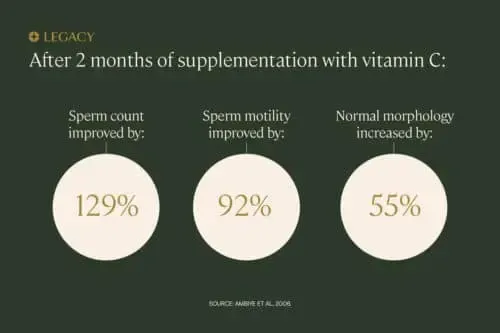
Vitamin E
Similar to vitamin C, vitamin E is an antioxidant that protects sperm from free radical damage. Typically combined with other supplements, this vitamin is associated with improved sperm motility, morphology, and genetic health.
Another essential nutrient, vitamin E acts as a powerful antioxidant that can decrease oxidative stress in much the same way that vitamin C does. Although this vitamin is likely to have beneficial effects on reproductive health on its own, most studies examining the role of vitamin E as a male fertility supplement and male fertility vitamin have combined supplementation with other antioxidants such as selenium or CoQ10.
One review examined the evidence for antioxidant supplements for sperm health. Researchers concluded that taking a combination of vitamin E and vitamin C was extremely effective in reducing sperm DNA fragmentation.
Another study found that after taking 400mg of vitamin E and 225ug of selenium for three months, levels of MDA (malondialdehyde) — a marker for oxidative stress — were greatly reduced in seminal plasma. Two additional studies (1, 2) have examined the use of vitamin E and selenium together as a male fertility supplement and male fertility vitamin. Both found that this combination of antioxidant supplementation was associated with improved semen parameters.
Folate
Also known as: folic acid, 5-MTHF (methyl folate)
Folate plays a critical role in reproductive health, as it is used in the creation, maturation, and development of sperm. Boosting folate levels may significantly increase sperm concentration.
Folate, a type of B-vitamin, is critical in a huge range of bodily processes, such as converting carbohydrates into energy, making red and white blood cells, and producing DNA and RNA. You may associate folate with pregnancy, as it is essential in the development of the baby’s brain and nervous system. However, it’s also incredibly important as a male fertility supplement and male fertility vitamin, as it plays a role in the creation and maturation of sperm.
Low levels of folate in the semen is, in fact, associated with lower sperm quality. One study found that seminal levels of folate were inversely correlated with sperm DNA fragmentation — meaning that the lower the folate levels, the higher the number of sperm with genetic damage.
High doses of folate used as a male fertility supplement and male fertility vitamin may be beneficial for sperm health. A 2017 review analyzing seven studies found strong evidence that folate used as a male fertility supplement was associated with increased sperm concentrations in men with fertility issues. This effect was even stronger when combined with zinc, and patients who received both nutrients had improved morphology as well.
Another study looked at the combination of folate, vitamin E, and selenium as a male fertility supplement and male fertility vitamin for men who had previously had surgery to fix a varicocele (swollen veins in the scrotum). This study found that taking these three ingredients for 6 months was associated with a statistically significant improvement in sperm count and motility. Other studies have not found this association.
Another study looked at the combination of folate, vitamin E, and selenium as a male fertility supplement for men who had previously had surgery to fix a varicocele (swollen veins in the scrotum). This study found that taking these three ingredients for 6 months was associated with a statistically significant improvement in sperm count and motility. Other studies have not found this association.
Selenium
Selenium has long been a staple in male fertility supplements and male fertility vitamins, and for good reason. There’s solid evidence that selenium—alone or in combination with vitamins C and E or folate—may improve sperm count, motility, and morphology.
Selenium is an important trace mineral, a term that means you only need a very small amount, with antioxidant properties. This nutrient plays a key role in metabolism as well as reproductive health. One study determined that lower levels of selenium (as well as zinc) in semen was correlated with poor sperm quality.
Many studies have looked at combination therapies for infertility, such as selenium and vitamin E, A, or C, and found benefits to fertility—we’ve explored many of those above. Additional sources include a recent 2021 study that found sperm motility was improved after 3 months of daily selenium, vitamin E, and folic acid supplementation.
But a recent study aimed to evaluate selenium as a male fertility supplement standalone therapy. Infertile men were prescribed 50μg (micrograms, not milligrams) of selenium once a day for three months; researchers found that sperm count, motility, vitality, and normal morphology were all noticeably increased after treatment, and levels of MDA — a marker of oxidative stress — significantly decreased.
Additionally, they found higher levels of testosterone and glutathione, a powerful antioxidant, both of which could also benefit fertility. This backed up the results of earlier research, which found that 56% of men treated with selenium experienced improved sperm motility, indicating selenium’s may be effective as a male fertility supplement.
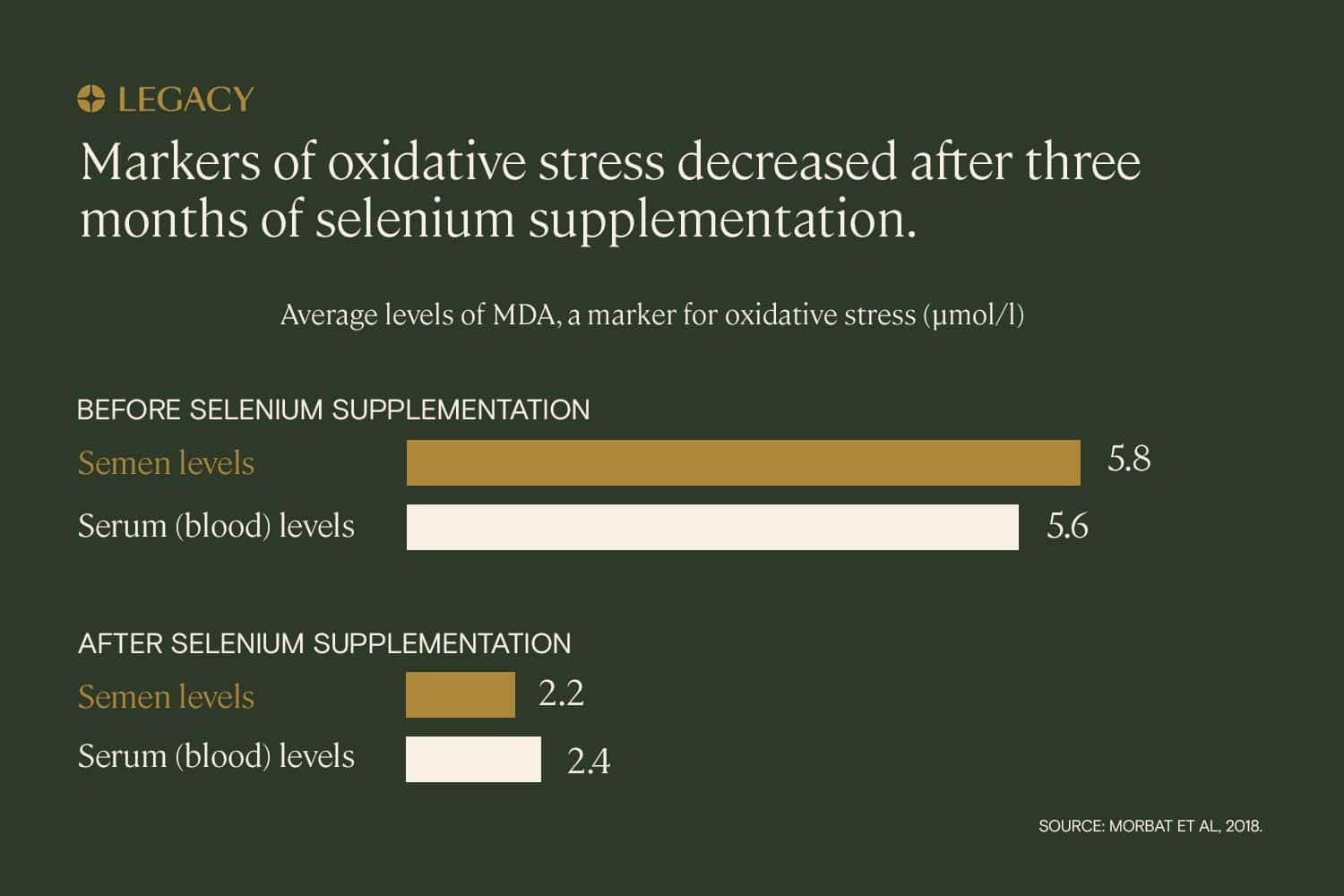
Lycopene
Lycopene is a potent antioxidant and an effective male fertility supplement. There’s evidence that adding lycopene to your diet may improve many aspects of male fertility — including sperm count, viability, quality, and genetic health — as well as pregnancy rates.
Lycopene is the compound responsible for the red and pink hues of tomatoes and watermelon, among other fruits and vegetables. It’s an antioxidant that can protect cells in the body from oxidative stress. While we can get lycopene from our food — pizza sauce and ketchup are actually the most common sources of lycopene in the American diet — it may also be valuable to boost lycopene intake with a male fertility supplement or male fertility vitamin.
A 2014 review of several small studies of lycopene’s impact on male fertility found that, when consumed in the form of a male fertility supplement, lycopene was associated with decreased oxidative stress and sperm DNA damage and increased sperm count, concentration, motility, and morphology. This review looked at studies of both healthy men and men diagnosed with infertility.
More recent studies support the use of lycopene for sperm improvement and fertility protection, as well. Animal studies demonstrate that, in rats who were exposed to toxins common in agriculture, lycopene as a male fertility supplement had a protective effect for the testes and sperm quality. In one placebo-controlled trial of 44 infertile men with oligozoospermia (low sperm count), supplementing with 25mg of lycopene was associated with a significant increase in sperm concentration, highlighting its impact when used as a male fertility supplement.

D-aspartic acid (D-AA)
D-AA regulates testosterone release. Three months of supplementation nearly doubled sperm concentration and increased motility by over 50%.
Not to be confused with aspartic acid, D-aspartic acid is an amino acid that’s concentrated in some body tissues and cells, such as testicles and sperm cells. Although there’s no definitive consensus on the issue, some studies suggest that D-AA may be used as a male fertility supplement.
Researchers noticed that levels of D-AA in semen were much lower in infertile men than in healthy controls. This is likely due to D-AA’s effect on testosterone levels; it seems to have a role in regulating the release and synthesis of testosterone, which can have powerful effects on reproductive health.
In fact, one study showed that supplementing with D-AA for 90 days significantly increased the concentration and motility of sperm, nearly doubling concentration and boosting motility by over 50%. Ultimately, this led to an improvement in the rate of pregnancies in their partners. While consensus is not yet definitive, D-aspartic acid may be used as a male fertility supplement to boost testosterone.
Zinc
Zinc is a critical player in male reproductive health. Zinc supplementation is associated with increases in sperm volume, motility, and normal morphology and is one of the most crucial male fertility supplements.
Commonly described as one of the most essential elements for male fertility, zinc is involved in a number of critical reproductive processes, such as spermatogenesis (sperm production), sperm stability, and testosterone release. Deficiencies in zinc may impede spermatogenesis and negatively impact testosterone levels, and can give rise to a number of sperm abnormalities.
It has been repeatedly shown that zinc concentrations in seminal plasma from infertile males is significantly lower than those from normal controls. Furthermore, zinc as a male fertility supplement has been associated with a significant increase in semen volume, sperm motility, and normal sperm morphology — especially in combination with folate, according to multiple studies.
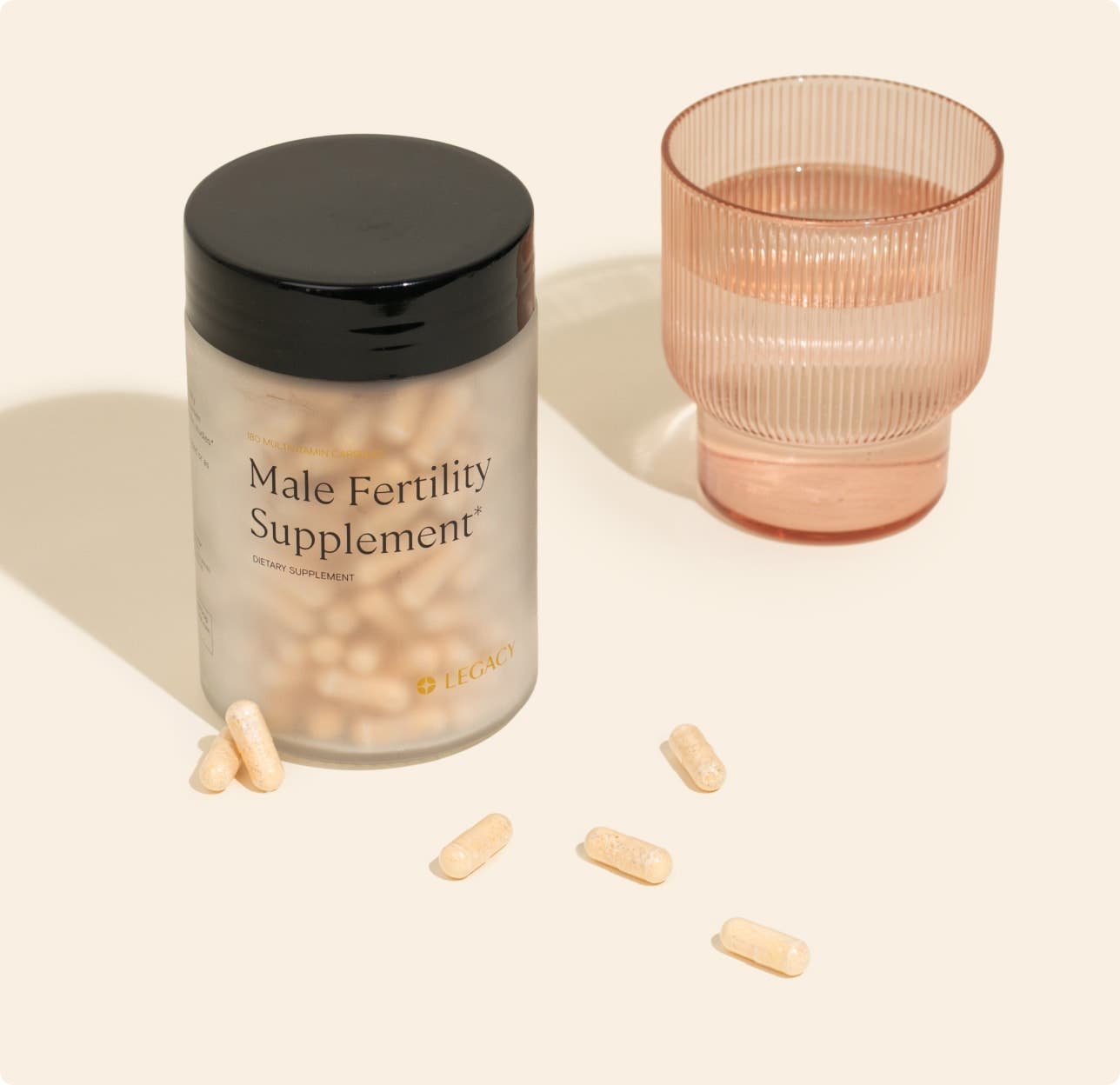
Science-backed male fertility multivitamin
Legacy’s Male Fertility Supplement
We offer a male fertility multivitamin that contains all the essential male fertility supplements in an easy twice-daily capsule. Ten carefully selected, research-backed active ingredients. No pseudoscience.
A comprehensive two-capsule-per-day male fertility supplement to support all aspects of sperm production and hormone health.
Small, easy-to-swallow capsules with no smell or aftertaste.
We chose the highest quality version of every ingredient for an easy-to-digest compound with the highest level of absorption, effectiveness, and safety.
\Vegetarian capsule does not contain gelatin, gluten, dairy, soy, fish, preservatives, genetically modified ingredients, sugar or sweeteners, or artificial colors or flavors.
Sustainable glass packaging with minimal plastic.
Learn more about the Male Fertility Supplement.
Other male fertility supplement ingredients
Beyond traditional male fertility supplements and male fertility vitamins, there are certain herbs and other ingredients that may play a role in improving both sperm and hormonal health. These ingredients have less robust evidence to support their use as a male fertility supplement.
Also known as: Indian ginseng
Ashwagandha increases serum levels of beneficial hormones such as testosterone. Three months of supplementation increased sperm counts by 167%, motility by 57%, and semen volume by 53%.
Ashwagandha is an adaptogen, a plant known to help the body resist stress and promote healing; it’s been linked to a number of health benefits, especially related to anxiety. However, one of its most prominent benefits is its effect on testosterone. Ashwagandha can significantly increase testosterone levels, possibly by increasing the activity of natural endogenous antioxidants. This makes it useful as a male fertility supplement.
One study demonstrated that supplementation with ashwagandha increased seminal concentrations of testosterone, LH, and FSH. Both LH and FSH are important in stimulating the testes to produce testosterone and sperm.
Another study showed that consuming 675mg of ashwagandha a day for three months improved both semen parameters and serum levels of beneficial hormones. Sperm count improved by 167%, semen volume by 53%, and sperm motility by 57%. Both testosterone and LH levels were also elevated after 90 days. Ashwagandha may be effective when used as a male fertility supplement.
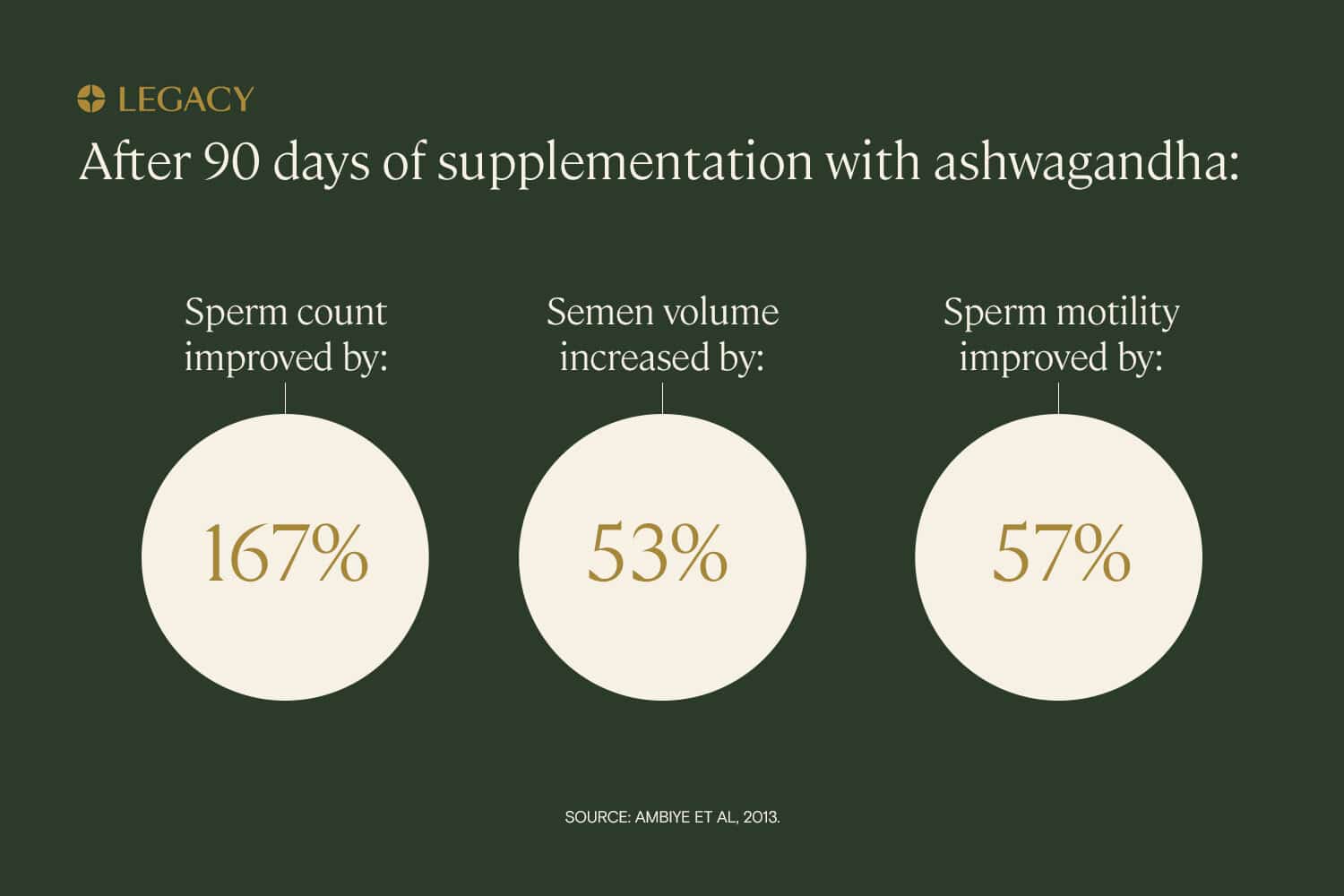
Fenugreek
Fenugreek may also be an effective male fertility supplement. Fenugreek may improve free testosterone levels, with increases of up to 46% after three months of supplementation. This benefits sperm parameters such as count and morphology, and boosts libido.
This herb, often found in your kitchen, has potent medicinal properties, and can be found in many male fertility supplements. Extracts derived from fenugreek seeds have been shown to have significant effects on hormone regulation and reproductive health.
One study examined the effects of Furosap, a male fertility supplement made from fenugreek seeds, on testosterone levels and sperm profile. Supplementation of 500mg per day for 12 weeks showed a 46% increase in free testosterone levels, as well as benefits on sperm count and morphology.
Another study aimed to evaluate Testofen, another extract of fenugreek, on improving sexual function in healthy aging males. They found that after supplementation with 600mg for 12 weeks, serum and free testosterone were higher and sexual function improved with an increase in libido.

Maca root powder
A natural aphrodisiac, maca root powder may also be beneficial as a male fertility supplement, increasing both sperm concentration and motility after 12 weeks of supplementation.
This plant, native to Peru, has a long history of culinary and medicinal use—it has traditionally been consumed for its high nutrition content and its ability to enhance libido. However, it may also be great for sperm health and male fertility.
One study gave men 1.75g of maca for 12 weeks to observe its effects on fertility. They found that both sperm concentration and motility were increased gradually throughout the treatment period, without any significant change in serum hormone levels.
Omega-3 fatty acids
Also known as: DHA
Omega-3 fatty acids have been found to improve measures of fertility. Supplementation for 32 weeks leads to a significant improvement in sperm concentration, total count, and motility, as well as protective antioxidant effects.
Omega 3s are more than just male fertility supplements—these fatty acids have been shown to have a myriad of health benefits, including everything from easing depression to controlling asthma. Found primarily in fish, omega-3s (especially EPA and DHA) are crucial for proper body functioning. When it comes to male reproductive health, omega-3s are essential in enhancing antioxidant activity in seminal fluid, as well as serving as important structural components of cell membranes.
One 2010 study explored the relationship between both omega-3 and omega-6 fatty acids and idiopathic (unexplained) male infertility. They found that infertile men generally had a higher ratio of omega-6s compared to omega-3s, and that lower levels of omega-3s correlated with decreased sperm quality. Another study demonstrated that supplementing with omega-3s for 32 weeks led to a dramatic improvement in sperm concentration.
A recent systematic review of omega-3 fatty acids as a male fertility supplement examined three studies that treated infertile men with EPA and DHA and observed their effects on semen parameters. They found that omega-3s used as a male fertility supplement increased sperm motility significantly, and that higher levels of DHA in seminal plasma contributed to a protective effect for the sperm.
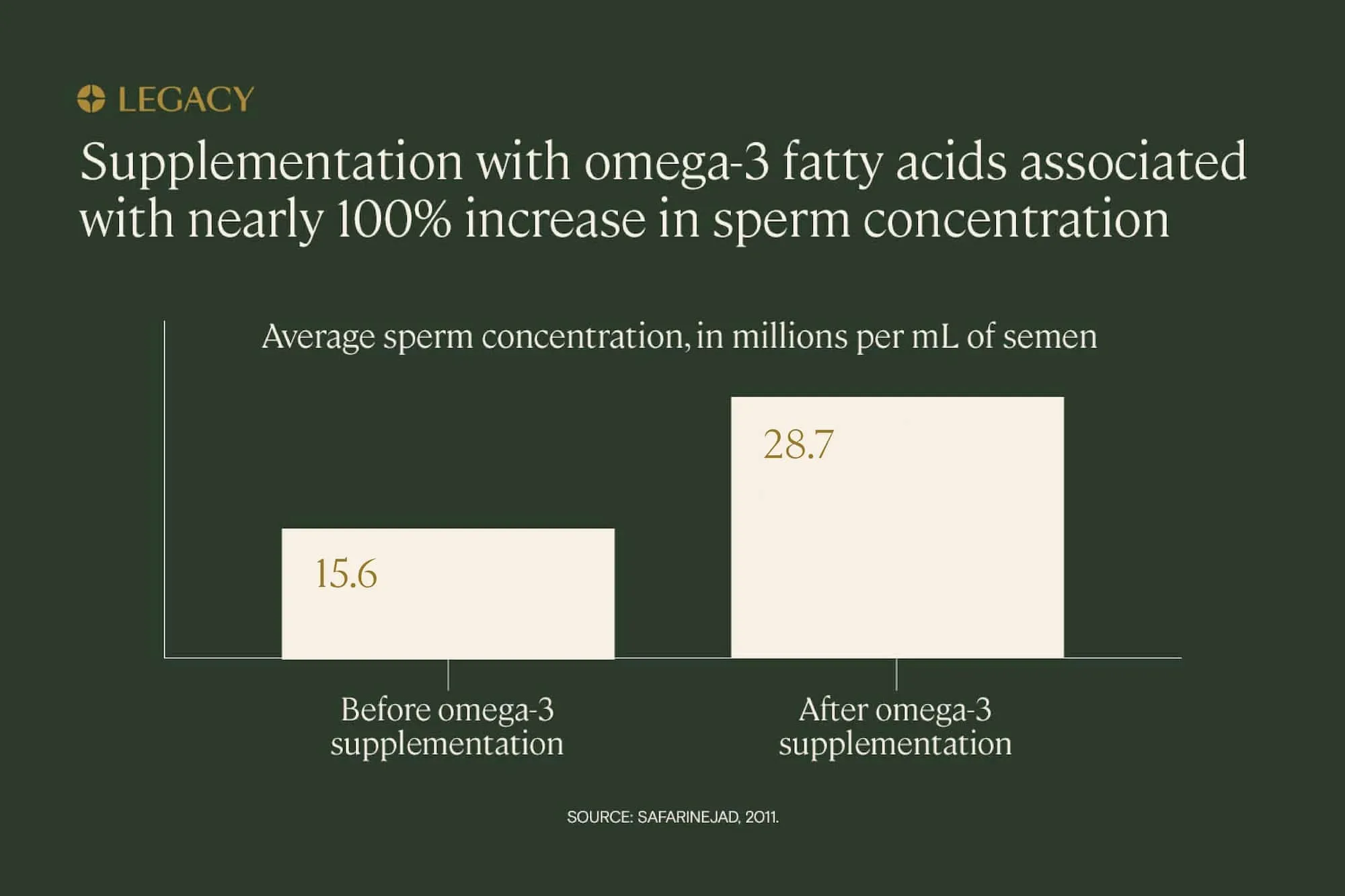
Tribulus terrestris
Also known as: Puncturevine
Tribulus terrestris can enhance libido and has beneficial effects on semen parameters such as count, motility, and morphology.
Tribulus terrestris has long been used as an aphrodisiac, a substance that stimulates sexual desire. While this on its own may enhance the chances of conceiving, puncturevine may also function as a male fertility supplement that improves sperm health and enhances the effects of testosterone.
One review looked at seven different clinical studies, concluding that consumption of tribulus terrestris was effective at improving the number, motility, and morphology of sperm samples from men with infertility.
Tips for taking male fertility supplements
Also known as: Puncturevine
Talk to your doctor before you start any new supplement, to ensure it’s okay for your specific health conditions and doesn’t interact with any medication you may already be taking.
Remember that spermatogenesis, the process of producing sperm, takes about 2–3 months. Depending on the supplement, you may need to take it regularly for 12 weeks or more before you see an impact.
You should understand your individual fertility health before you start a supplementation regimen. A great way to do that is by taking an at-home sperm analysis with Legacy.
References
CoQ10
- A. Lewin and H. Lavon. “The effect of coenzyme Q10 on sperm motility and function.” Molecular Aspects of Medicine, 1997.
- Rafael Lafuente et al. “Coenzyme Q10 and male infertility: a meta-analysis.” Journal of Assisted Reproduction and Genetics, 2013.
- Rahul Vishvkarma et al. “Coenzyme Q10 effect on semen parameters: Profound or meagre?” Andrologia, 2020.
L-carnitine
- Giancarlo Balercia, MD et al. “Placebo-controlled double-blind randomized trial on the use of l-carnitine, l-acetylcarnitine, or combined l-carnitine and l-acetylcarnitine in men with idiopathic asthenozoospermia.” Fertility & Sterility, 2005.
- Andrea Garolla et al. “Oral carnitine supplementation increases sperm motility in asthenozoospermic men with normal sperm phospholipid hydroperoxide glutathione peroxidase levels.” Fertility & Sterility, 2005.
- Andrea Lenzi et al. “A placebo-controlled double-blind randomized trial of the use of combined l-carnitine and l-acetyl-carnitine treatment in men with asthenozoospermia.” Fertility & Sterility, 2005.
- Li-Lan Sun et al. “L-carnitine improves sperm acrosin activity in male infertility patients.” Zhonghua Nan Ke Xue, 2018.
- Zheng-Mu Wu et al. “Short-term medication of L-carnitine before intracytoplasmic sperm injection for infertile men with oligoasthenozoospermia.” Zhonghua Nan Ke Xue, 2012.
- Elham Aliabadi, PhD et al. “Effects of L-carnitine and L-acetyl-carnitine on testicular sperm motility and chromatin quality.” Iranian Journal of Reproductive Medicine, 2012.
- Long-Long Fu et al. “L-carnitine protects the motion parameters and mitochondrial function of human sperm in cryopreservation.” Zhonghua Nan Ke Xue, 2018.
Vitamin D
- Inari M. Ciccone et al. “Serum vitamin D content is associated with semen parameters and serum testosterone levels in men.” Asian Journal of Andrology, 2021.
- Martin Blomberg Jensen et al. “Vitamin D is positively associated with sperm motility and increases intracellular calcium in human spermatozoa.” Human Reproduction, 2011.
- Cristina de Angelis et al. “The role of vitamin D in male fertility: A focus on the testis.” Reviews in Endocrine and Metabolic Disorders, 2017.
- Mahin Taheri Moghadam et al. “Effects of Vitamin D on Apoptosis and Quality of Sperm in Asthenozoospermia.” JBRA Assisted Reproduction, 2020.Xiao-Lin Deng et al. “Efficacy and safety of vitamin D in the treatment of idiopathic oligoasthenozoospermia.” Zhonghua Nan Ke Xue, 2014.
Vitamin C
- Abasalt H. Colagar et al. “Ascorbic Acid in Human Seminal Plasma: Determination and Its Relationship to Sperm Quality.” Journal of Clinical Biochemistry and Nutrition, 2009.
- Ermanno Greco et al. “ICSI in cases of sperm DNA damage: beneficial effect of oral antioxidant treatment.” Human Reproduction, 2005.
- Mohammed Akmal et al. “Improvement in human semen quality after oral supplementation of vitamin C.” Journal of Medicinal Food, 2006.
- Ali Cyrus et al. “The effect of adjuvant vitamin C after varicocele surgery on sperm quality and quantity in infertile men: a double blind placebo controlled clinical trial.” International Brazilian Journal of Urology, 2015.
Vitamin E
- Ermanno Greco et al. “Reduction of the incidence of sperm DNA fragmentation by oral antioxidant treatment.” Journal of Andrology, 2005.
- Sedigheh Ahmadi et al. “Antioxidant supplements and semen parameters: An evidence based review.” International Journal of Reproductive Biomedicine, 2016.Mohammad K. Moslemi et al. “Selenium–vitamin E supplementation in infertile men: effects on semen parameters and pregnancy rate.” International Journal of General Medicine, 2011.
- L Keskes-Ammar et al. “Sperm oxidative stress and the effect of an oral vitamin E and selenium supplement on semen quality in infertile men.” Archives of Andrology, 2003.
- C. Ross et al. “A systematic review of the effect of oral antioxidants on male infertility.” Reproductive Biomedicine Online, 2010.
Folate
- Jolanda C. Boxmeer et al. “Low folate in seminal plasma is associated with increased sperm DNA damage.” Fertility & Sterility, 2009.
- Morvarid Irani et al. “The Effect of Folate and Folate Plus Zinc Supplementation on Endocrine Parameters and Sperm Characteristics in Sub-Fertile Men: A Systematic Review and Meta-Analysis.” The Journal of Urology, 2017.
- Arash Ardestani Zadeh et al. “The role of Vitamin E – Selenium – Folic Acid Supplementation in Improving Sperm Parameters After Varicocelectomy: A Randomized Clinical Trial.” Urology Journal, 2019.
Selenium
- Galina Nenkova et al. “Role of Trace Elements for Oxidative Status and Quality of Human Sperm.” Balkan Medical Journal, 2017.
- Ahmed T. Alahmar. “The effects of oral antioxidants on the semen of men with idiopathic oligoasthenoteratozoospermia.” Clinical and Experimental Reproductive Medicine, 2018.
- Rezvan Bahmyari et al. “The Effect of Daily Intake of Selenium, Vitamin E and Folic Acid on Sperm Parameters in Males with Idiopathic Infertility: A Single-Blind Randomized Controlled Clinical Trial.” International Journal of Fertility & Sterility, 2021.
- Mossa M. Morbat et al. “Effect of Selenium in Treatment of Male Infertility.” Experimental Techniques in Urology & Nephrology, 2018.
- R. Scott et al. “The effect of oral selenium supplementation on human sperm motility.” British Journal of Urology, 1998.
Lycopene
- Mehran Nouri et al. “The effects of lycopene supplement on the spermatogram and seminal oxidative stress in infertile men: A randomized, double-blind, placebo-controlled clinical trial.” Phytotherapy Research, 2019.
- Emre Kaya et al. “Evaluation of ameliorating effect of lycopene against testicular toxicity due to diethylnitrosamine using biochemical, spermatological and histopathological data.” Andrologia, 2019.
- D Durairajanayagam et al. “Lycopene and male infertility.” Asian Journal of Andrology, 2014.
D-aspartic acid
- Gemma D’Aniello, MD et al. “Occurrence of D-aspartic acid in human seminal plasma and spermatozoa: Possible role in reproduction.” Fertility & Sterility, 2005.
- Gemma D’Aniello, MD et al. “D-Aspartate, a Key Element for the Improvement of Sperm Quality.” Advances in Sexual Medicine, 2012.
Zinc
- Diana Chu. “Zinc: A small molecule with a big impact on sperm function.” PLoS Biology, 2018.
- Andrea Milostić-Srb et al. “Importance of zinc concentration in seminal fluid of men diagnosed with infertility.” Acta Clinica Croatia, 2020.
- Ali Fallah et al. “Zinc is an Essential Element for Male Fertility: A Review of Zn Roles in Men’s Health, Germination, Sperm Quality, and Fertilization.” Journal of Reproduction & Fertility, 2018.
- Morvarid Irani et al. “The Effect of Folate and Folate Plus Zinc Supplementation on Endocrine Parameters and Sperm Characteristics in Sub-Fertile Men: A Systematic Review and Meta-Analysis.” Urology Journal, 2017.
- Wai Yee Wong et al. “Effects of folic acid and zinc sulfate on male factor subfertility: a double-blind, randomized, placebo-controlled trial.” Fertility & Sterility, 2002.
Ashwagandha
- Mohammad Kaleem Ahmad, M.Sc. et al. “Withania somnifera improves semen quality by regulating reproductive hormone levels and oxidative stress in seminal plasma of infertile males.” Fertility & Sterility, 2010.
- Vijay R. Ambiye et al. “Clinical Evaluation of the Spermatogenic Activity of the Root Extract of Ashwagandha (Withania somnifera) in Oligospermic Males: A Pilot Study.” Evidence-Based Complementary and Alternative Medicine, 2013.
Fenugreek
- Anuj Maheshwari et al. “Efficacy of Furosap, a novel Trigonella foenum-graecum seed extract, in Enhancing Testosterone Level and Improving Sperm Profile in Male Volunteers.” International Journal of Medical Sciences, 2017.
- Amanda Rao et al. “Testofen, a specialised Trigonella foenum-graecum seed extract reduces age-related symptoms of androgen decrease, increases testosterone levels and improves sexual function in healthy aging males in a double-blind randomised clinical study.” Aging Male, 2016.
Maca root
Omega-3 fatty acids
- Mohammad Reza Safarinejad et al. “Relationship of omega-3 and omega-6 fatty acids with semen characteristics, and anti-oxidant status of seminal plasma: a comparison between fertile and infertile men.” Clinical Nutrition, 2010.
- MR Safarinejad. “Effect of omega-3 polyunsaturated fatty acid supplementation on semen profile and enzymatic anti-oxidant capacity of seminal plasma in infertile men with idiopathic oligoasthenoteratospermia: a double-blind, placebo-controlled, randomised study.” Andrologia, 2011.
- Banafshe Hosseini et al. “The Effect of Omega-3 Fatty Acids, EPA, and/or DHA on Male Infertility: A Systematic Review and Meta-analysis.” Journal of Dietary Supplements, 2018.
Tribulus terrestris